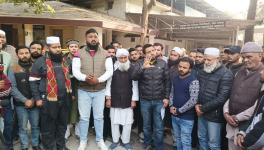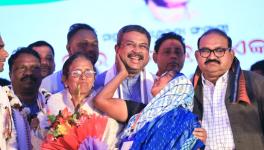India: How Farmers' Movement May Shape Punjab's Political Future
Smaller political parties in agrarian Punjab say they can better represent farmers' interests
Anuroop Kaur Sandhu was an assistant professor at Delhi University last year when India saw one of the largest protests in its history.
Thousands of farmers, primarily from the northern states of Punjab, Haryana and Uttar Pradesh marched to the borders of Delhi to demand the repeal of contentious agricultural laws passed by Prime Minister Narendra Modi’s ruling government.
After months of ongoing protest, the legislation was scrapped in December 2021.
Sandhu is a member of a new, younger generation that is joining Indian politics as members of budding parties formed out of the farmers' unions and the momentum the protests achieved.
As Punjab goes to polls on Sunday for state elections, they face their first test. Sandhu is running in the Punjab city of Sri Muktsar Sahib as a candidate with Sanyukt Samaj Morcha (SSM), a new political party formed by a group of farm union leaders.
"Our political parties have failed us. We were forced to sit outside another state for an entire year, just for our rights," 29-year-old Sandhu told DW, referring to the thousands of farmers who camped out on the outskirts of Delhi during the protest movement.
Sandhu added that the Aam Aadmi Party (APP), an alternative party formed in 2012 that currently runs the government of Delhi, did not back up the farmers during the protests. She said the SSM would better represent those who believed in the farmers' message.
Farmers' protests trigger political movement
In the midst of the pandemic in 2020, Modi's Bharatiya Janata Party (BJP) governmentintroduced three agricultural bills.
The bill was touted by the government as giving farmers the freedom to sell their produce anywhere in the country and enter into contracts with unlicensed buyers at a pre-agreed price.
However, many farmers said they already had these freedoms, and accused the government of avoiding the responsibility of ensuring produce was sold at a minimum price.
Farmers feared the reforms would leave them at the mercy of corporations with no government safeguards in place.
More than 700 farmers would die during the ensuing protests. When asked if there were plans to provide financial assistance to their families, the Ministry of Agriculture and Farmer's Welfare said it had no records of deaths.
However, Sandhu and others had been keeping track of protester deaths. She had taken note of each death linked to the protest as part of a project called "The Human Cost of the Farmers Protest”.
"I wanted to see how apathetic the government could be. Did they really care about us as citizens? If they did, even one life lost would be a travesty," she said.
Punjab's agricultural identity
While the demonstrations were led by an organization of farmer unions called the Sanyukt Kisan Morcha (SKM), Punjabi politics also rallied behind the protesting farmers.
Punjab is primarily an agriculture-dependent state and solidarity with the farmers unified people across party lines.
The BJP lost its longstanding ally in Punjab, when the center-right party Shiromani Akali Dal (SAD) quit the alliance over the protests.
Harmeet Singh Sandhu, an SAD candidate for a seat in the Punjab city of Tarn Taran, said that that his party was also part of the protests, and that the SSM is not the "sole representative of the farmers in our largely agrarian society."
"Our representatives were at each protest site but we didn't use the party flags as the movement transcended political divisions – it was a question of Punjab's future," the three-term legislator said.
The SKM farmers union organization said the movement would not be co-opted by any political party and had dismissed any notion of running in elections as a political party after the laws were repealed.
"At the time, the unions asserted that they wouldn't participate in active politics. Now, many supporters are feeling a sense of betrayal as they see the formulation of SSM as a failure to honor that promise," Satnam Singh, who heads the political science department at Guru Nanak Dev University in Amritsar, told DW.
Punjab's pivotal election
Singh described this week's state election as a break from the norm. While traditional leaders in Punjab's politics like SAD and Congress may retain their core seats, the conversation has been centered around giving new entrants such as the AAP a chance.
"The long-standing issues that Punjab currently faces, including increasing debt and drug addiction, are not a part of the conversation in this election cycle," Singh said.
"Instead, it's a tussle between the traditional and new political elite."
While the SSM has put social issues at the forefront of their manifesto, the newly-formed party is not getting the support they expected, said Sandeep Singh, an independent Punjabi journalist.
"At the peak of the movement, people across party lines were supporting the farmers' protests in New Delhi," he told DW. "Now they've returned to their traditional allegiances. Some looking for change seem to be leaning towards AAP."
Election merchandise seen at a market in Amritsar in Punjab
However, Sandhu said the Delhi-based AAP cannot be entrusted with governing Punjab.
"The AAP is not a party from Punjab, they do not understand its people. Delhi is very different from Punjab. We are primarily an agricultural state and the corporate model of governance that AAP follows cannot be replicated here," she said.
Despite the criticism that SSM is facing for turning to politics, Singh said that political parties last because of the legacy of their origins.
"All major political parties contesting these elections find their roots in social movements."
While the Congress party was linked to India’s freedom struggle, the SAD emerged from the Gurdwara Reform Movement, a campaign to reform Indian gurdwaras in the early 1920s.
The AAP was formed from a civil society movement born in the backdrop of corruption scandals during the Congress-led regime, just as SSM is finding its roots in the farmers' protests.
But the SSM is not just looking to win seats this election, Sandhu said.
"We are spreading awareness among the electorate about what they should expect from a candidate. This is pushing other parties to bring better candidates into the fray."
Edited by: Wesley Rahn
Get the latest reports & analysis with people's perspective on Protests, movements & deep analytical videos, discussions of the current affairs in your Telegram app. Subscribe to NewsClick's Telegram channel & get Real-Time updates on stories, as they get published on our website.
























